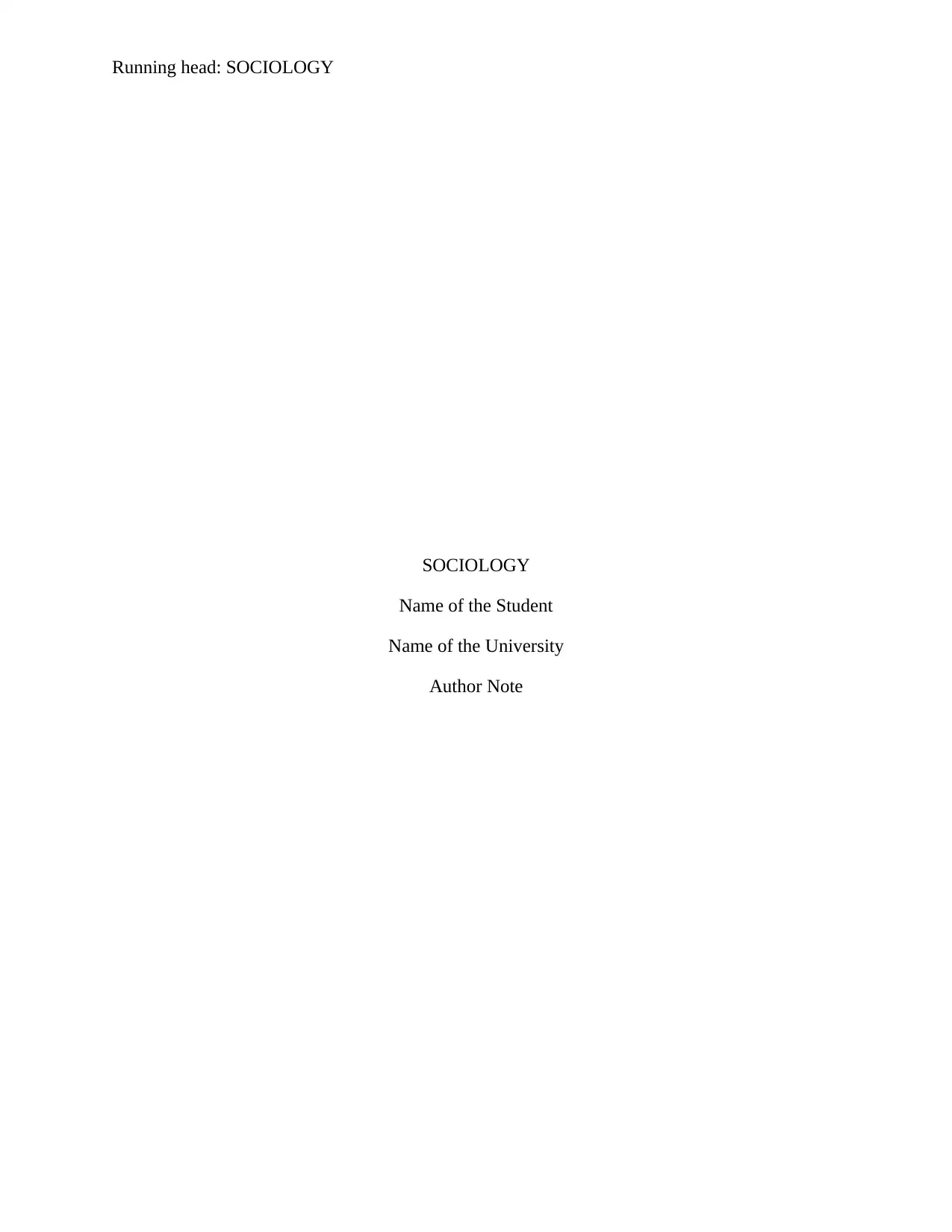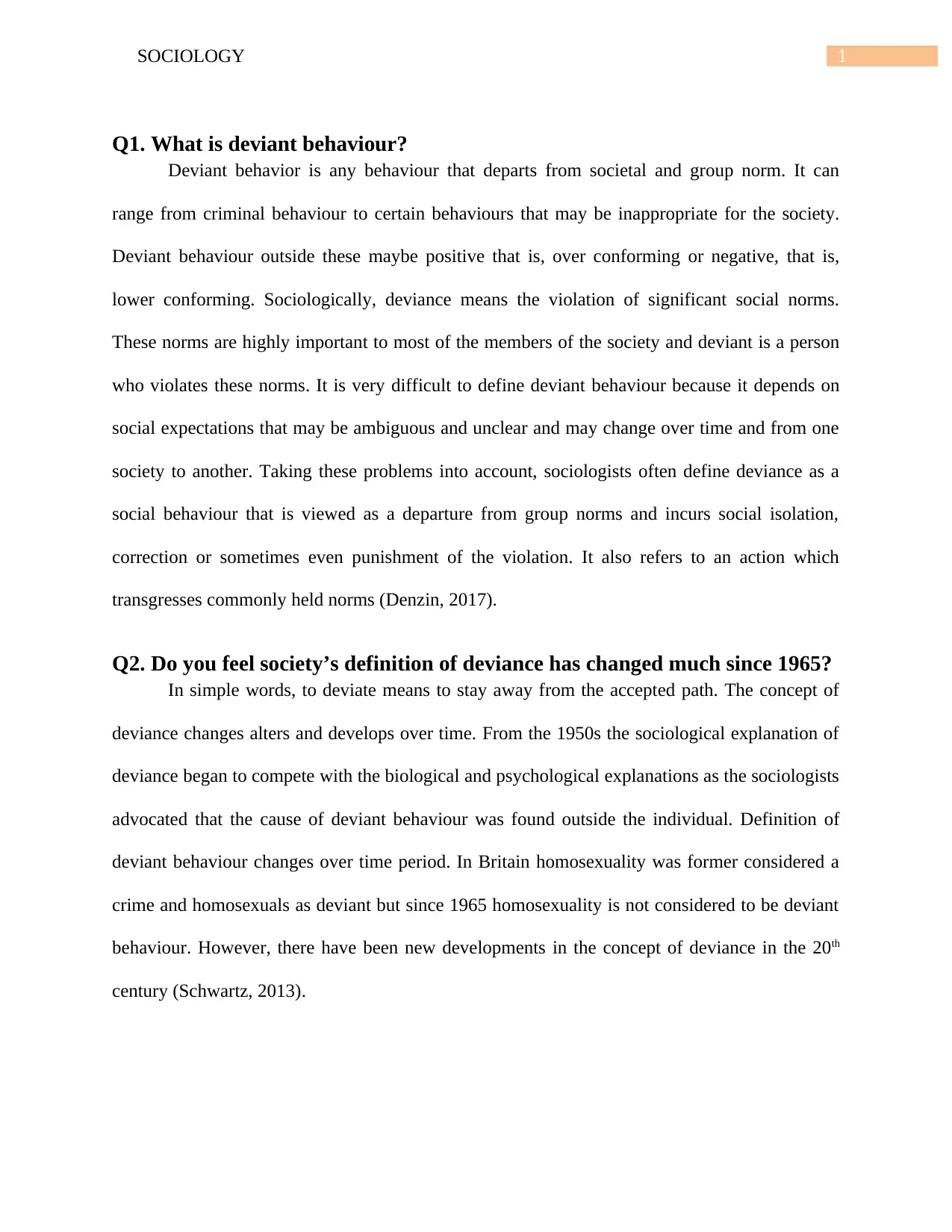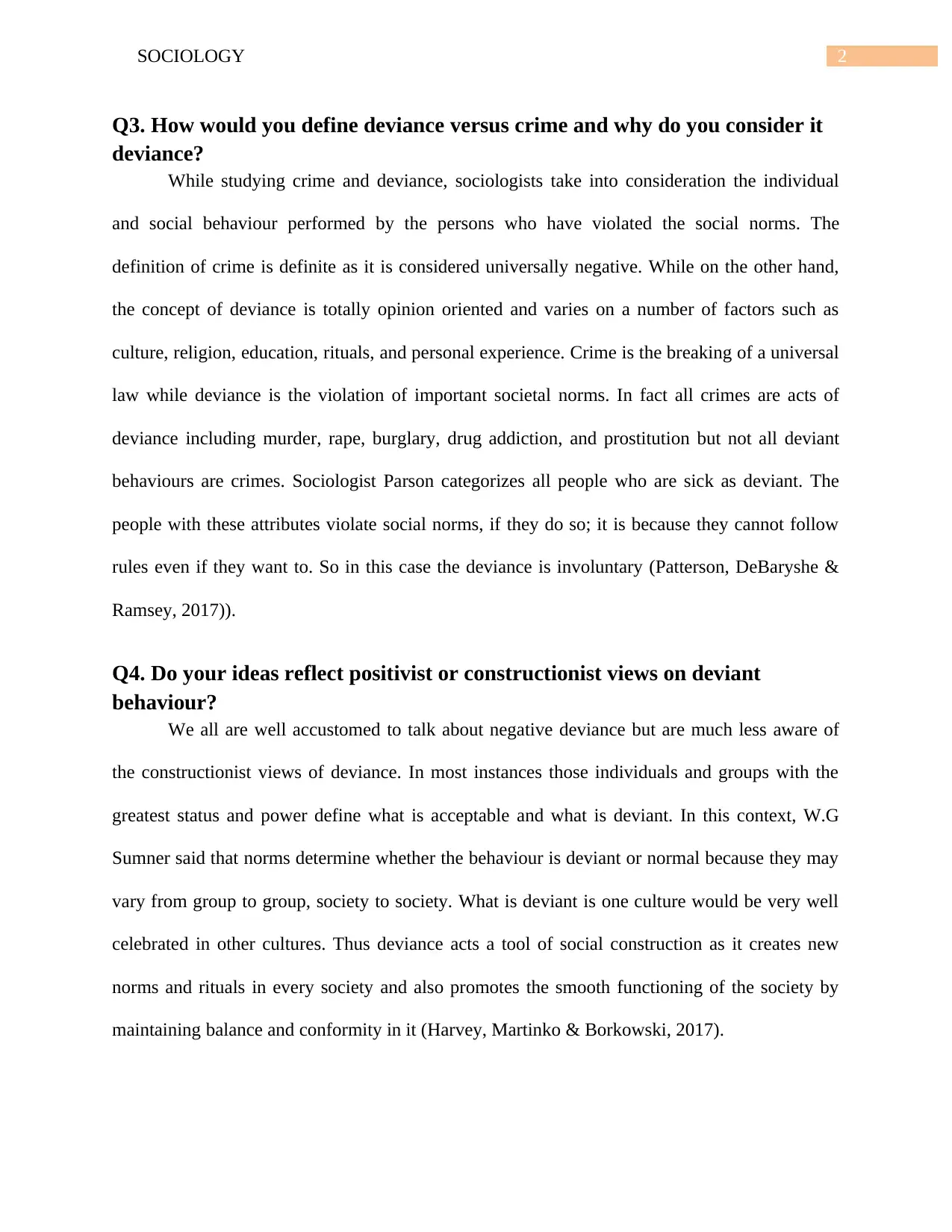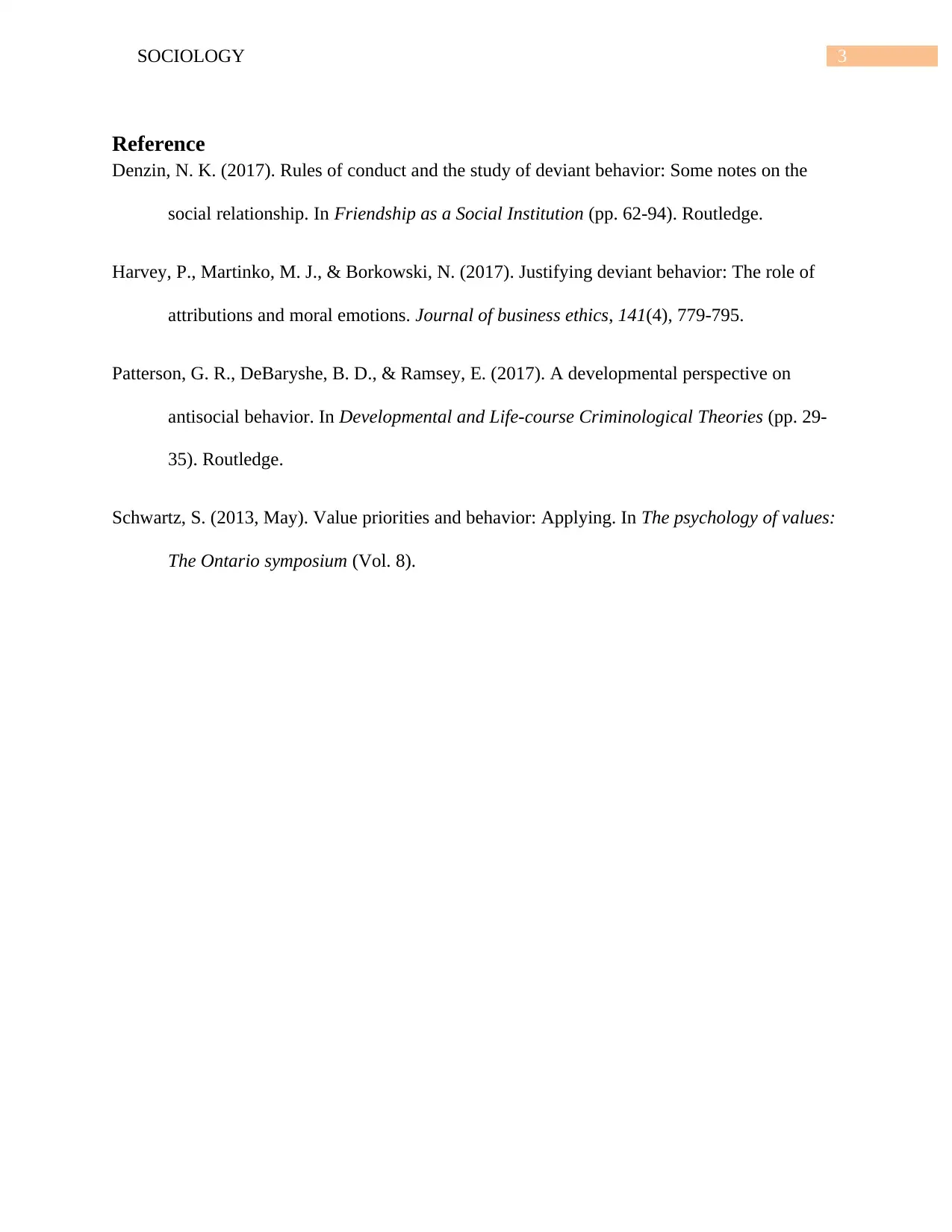Sociology Assignment: Analyzing Deviant Behavior in Society
VerifiedAdded on 2023/01/10
|4
|818
|90
Homework Assignment
AI Summary
This sociology assignment delves into the concept of deviant behavior, differentiating it from crime and exploring how societal definitions have evolved. It examines the violation of social norms, the influence of culture, religion, and personal experiences on the perception of deviance, and the distinction between crime as a violation of universal law and deviance as a violation of societal norms. The assignment further explores the changing perspectives on deviance, using homosexuality in Britain as an example, and considers both positivist and constructionist views. The student highlights the role of power in defining deviance and the function of deviance in maintaining social order. The assignment also includes references to academic literature supporting the arguments presented.

Running head: SOCIOLOGY
SOCIOLOGY
Name of the Student
Name of the University
Author Note
SOCIOLOGY
Name of the Student
Name of the University
Author Note
Paraphrase This Document
Need a fresh take? Get an instant paraphrase of this document with our AI Paraphraser

1SOCIOLOGY
Q1. What is deviant behaviour?
Deviant behavior is any behaviour that departs from societal and group norm. It can
range from criminal behaviour to certain behaviours that may be inappropriate for the society.
Deviant behaviour outside these maybe positive that is, over conforming or negative, that is,
lower conforming. Sociologically, deviance means the violation of significant social norms.
These norms are highly important to most of the members of the society and deviant is a person
who violates these norms. It is very difficult to define deviant behaviour because it depends on
social expectations that may be ambiguous and unclear and may change over time and from one
society to another. Taking these problems into account, sociologists often define deviance as a
social behaviour that is viewed as a departure from group norms and incurs social isolation,
correction or sometimes even punishment of the violation. It also refers to an action which
transgresses commonly held norms (Denzin, 2017).
Q2. Do you feel society’s definition of deviance has changed much since 1965?
In simple words, to deviate means to stay away from the accepted path. The concept of
deviance changes alters and develops over time. From the 1950s the sociological explanation of
deviance began to compete with the biological and psychological explanations as the sociologists
advocated that the cause of deviant behaviour was found outside the individual. Definition of
deviant behaviour changes over time period. In Britain homosexuality was former considered a
crime and homosexuals as deviant but since 1965 homosexuality is not considered to be deviant
behaviour. However, there have been new developments in the concept of deviance in the 20th
century (Schwartz, 2013).
Q1. What is deviant behaviour?
Deviant behavior is any behaviour that departs from societal and group norm. It can
range from criminal behaviour to certain behaviours that may be inappropriate for the society.
Deviant behaviour outside these maybe positive that is, over conforming or negative, that is,
lower conforming. Sociologically, deviance means the violation of significant social norms.
These norms are highly important to most of the members of the society and deviant is a person
who violates these norms. It is very difficult to define deviant behaviour because it depends on
social expectations that may be ambiguous and unclear and may change over time and from one
society to another. Taking these problems into account, sociologists often define deviance as a
social behaviour that is viewed as a departure from group norms and incurs social isolation,
correction or sometimes even punishment of the violation. It also refers to an action which
transgresses commonly held norms (Denzin, 2017).
Q2. Do you feel society’s definition of deviance has changed much since 1965?
In simple words, to deviate means to stay away from the accepted path. The concept of
deviance changes alters and develops over time. From the 1950s the sociological explanation of
deviance began to compete with the biological and psychological explanations as the sociologists
advocated that the cause of deviant behaviour was found outside the individual. Definition of
deviant behaviour changes over time period. In Britain homosexuality was former considered a
crime and homosexuals as deviant but since 1965 homosexuality is not considered to be deviant
behaviour. However, there have been new developments in the concept of deviance in the 20th
century (Schwartz, 2013).

2SOCIOLOGY
Q3. How would you define deviance versus crime and why do you consider it
deviance?
While studying crime and deviance, sociologists take into consideration the individual
and social behaviour performed by the persons who have violated the social norms. The
definition of crime is definite as it is considered universally negative. While on the other hand,
the concept of deviance is totally opinion oriented and varies on a number of factors such as
culture, religion, education, rituals, and personal experience. Crime is the breaking of a universal
law while deviance is the violation of important societal norms. In fact all crimes are acts of
deviance including murder, rape, burglary, drug addiction, and prostitution but not all deviant
behaviours are crimes. Sociologist Parson categorizes all people who are sick as deviant. The
people with these attributes violate social norms, if they do so; it is because they cannot follow
rules even if they want to. So in this case the deviance is involuntary (Patterson, DeBaryshe &
Ramsey, 2017)).
Q4. Do your ideas reflect positivist or constructionist views on deviant
behaviour?
We all are well accustomed to talk about negative deviance but are much less aware of
the constructionist views of deviance. In most instances those individuals and groups with the
greatest status and power define what is acceptable and what is deviant. In this context, W.G
Sumner said that norms determine whether the behaviour is deviant or normal because they may
vary from group to group, society to society. What is deviant is one culture would be very well
celebrated in other cultures. Thus deviance acts a tool of social construction as it creates new
norms and rituals in every society and also promotes the smooth functioning of the society by
maintaining balance and conformity in it (Harvey, Martinko & Borkowski, 2017).
Q3. How would you define deviance versus crime and why do you consider it
deviance?
While studying crime and deviance, sociologists take into consideration the individual
and social behaviour performed by the persons who have violated the social norms. The
definition of crime is definite as it is considered universally negative. While on the other hand,
the concept of deviance is totally opinion oriented and varies on a number of factors such as
culture, religion, education, rituals, and personal experience. Crime is the breaking of a universal
law while deviance is the violation of important societal norms. In fact all crimes are acts of
deviance including murder, rape, burglary, drug addiction, and prostitution but not all deviant
behaviours are crimes. Sociologist Parson categorizes all people who are sick as deviant. The
people with these attributes violate social norms, if they do so; it is because they cannot follow
rules even if they want to. So in this case the deviance is involuntary (Patterson, DeBaryshe &
Ramsey, 2017)).
Q4. Do your ideas reflect positivist or constructionist views on deviant
behaviour?
We all are well accustomed to talk about negative deviance but are much less aware of
the constructionist views of deviance. In most instances those individuals and groups with the
greatest status and power define what is acceptable and what is deviant. In this context, W.G
Sumner said that norms determine whether the behaviour is deviant or normal because they may
vary from group to group, society to society. What is deviant is one culture would be very well
celebrated in other cultures. Thus deviance acts a tool of social construction as it creates new
norms and rituals in every society and also promotes the smooth functioning of the society by
maintaining balance and conformity in it (Harvey, Martinko & Borkowski, 2017).
⊘ This is a preview!⊘
Do you want full access?
Subscribe today to unlock all pages.

Trusted by 1+ million students worldwide

3SOCIOLOGY
Reference
Denzin, N. K. (2017). Rules of conduct and the study of deviant behavior: Some notes on the
social relationship. In Friendship as a Social Institution (pp. 62-94). Routledge.
Harvey, P., Martinko, M. J., & Borkowski, N. (2017). Justifying deviant behavior: The role of
attributions and moral emotions. Journal of business ethics, 141(4), 779-795.
Patterson, G. R., DeBaryshe, B. D., & Ramsey, E. (2017). A developmental perspective on
antisocial behavior. In Developmental and Life-course Criminological Theories (pp. 29-
35). Routledge.
Schwartz, S. (2013, May). Value priorities and behavior: Applying. In The psychology of values:
The Ontario symposium (Vol. 8).
Reference
Denzin, N. K. (2017). Rules of conduct and the study of deviant behavior: Some notes on the
social relationship. In Friendship as a Social Institution (pp. 62-94). Routledge.
Harvey, P., Martinko, M. J., & Borkowski, N. (2017). Justifying deviant behavior: The role of
attributions and moral emotions. Journal of business ethics, 141(4), 779-795.
Patterson, G. R., DeBaryshe, B. D., & Ramsey, E. (2017). A developmental perspective on
antisocial behavior. In Developmental and Life-course Criminological Theories (pp. 29-
35). Routledge.
Schwartz, S. (2013, May). Value priorities and behavior: Applying. In The psychology of values:
The Ontario symposium (Vol. 8).
1 out of 4
Related Documents
Your All-in-One AI-Powered Toolkit for Academic Success.
+13062052269
info@desklib.com
Available 24*7 on WhatsApp / Email
![[object Object]](/_next/static/media/star-bottom.7253800d.svg)
Unlock your academic potential
Copyright © 2020–2026 A2Z Services. All Rights Reserved. Developed and managed by ZUCOL.





